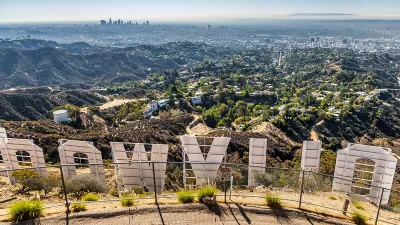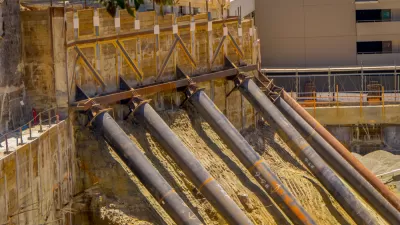L.A. voters approved Measure JJJ in 2016 in the hopes of encouraging more affordable housing as a trade-off for discretionary approval. The result has been no development at all.

"Housing production in Los Angeles has slowed in the two years since Measure JJJ took effect, reports Steven Sharp, sharing research from the University of California Berkeley's College of Environmental Design and Los Angeles-based thinktank LAplus.
"The ballot measure, which was approved by 65 percent of voters in the November 2016 election, requires that all Los Angeles developments seeking zone changes or general plan amendments employ prevailing wage labor and set aside a percentage of residential units for lower-income households," according to Sharp's explanation.
While 19,000 such projects were proposed from 2016 to 2017, they've since "ground to a halt."
Sharp explains why: "Few projects have filed for entitlements under the Measure JJJ rules, and only one project has been approved to date. Citing interviews with several developers, the report points to Measure JJJ's prevailing wage requirement as the primary impediment to the use of zone changes and general plan amendments."
Some of that lost production has been offset by the city's Transit Oriented Communities guidelines, which were also enacted by Measure JJJ and have shown positive early returns. According to the report, however, development in the city overall has declined by 11.3 percent since Measure JJJ took effect.
FULL STORY: Study: Housing Production Slows in Los Angeles Following Passage of Measure JJJ

Planetizen Federal Action Tracker
A weekly monitor of how Trump’s orders and actions are impacting planners and planning in America.

Restaurant Patios Were a Pandemic Win — Why Were They so Hard to Keep?
Social distancing requirements and changes in travel patterns prompted cities to pilot new uses for street and sidewalk space. Then it got complicated.

Map: Where Senate Republicans Want to Sell Your Public Lands
For public land advocates, the Senate Republicans’ proposal to sell millions of acres of public land in the West is “the biggest fight of their careers.”

Maui's Vacation Rental Debate Turns Ugly
Verbal attacks, misinformation campaigns and fistfights plague a high-stakes debate to convert thousands of vacation rentals into long-term housing.

San Francisco Suspends Traffic Calming Amidst Record Deaths
Citing “a challenging fiscal landscape,” the city will cease the program on the heels of 42 traffic deaths, including 24 pedestrians.

California Homeless Arrests, Citations Spike After Ruling
An investigation reveals that anti-homeless actions increased up to 500% after Grants Pass v. Johnson — even in cities claiming no policy change.
Urban Design for Planners 1: Software Tools
This six-course series explores essential urban design concepts using open source software and equips planners with the tools they need to participate fully in the urban design process.
Planning for Universal Design
Learn the tools for implementing Universal Design in planning regulations.
Heyer Gruel & Associates PA
JM Goldson LLC
Custer County Colorado
City of Camden Redevelopment Agency
City of Astoria
Transportation Research & Education Center (TREC) at Portland State University
Camden Redevelopment Agency
City of Claremont
Municipality of Princeton (NJ)




























